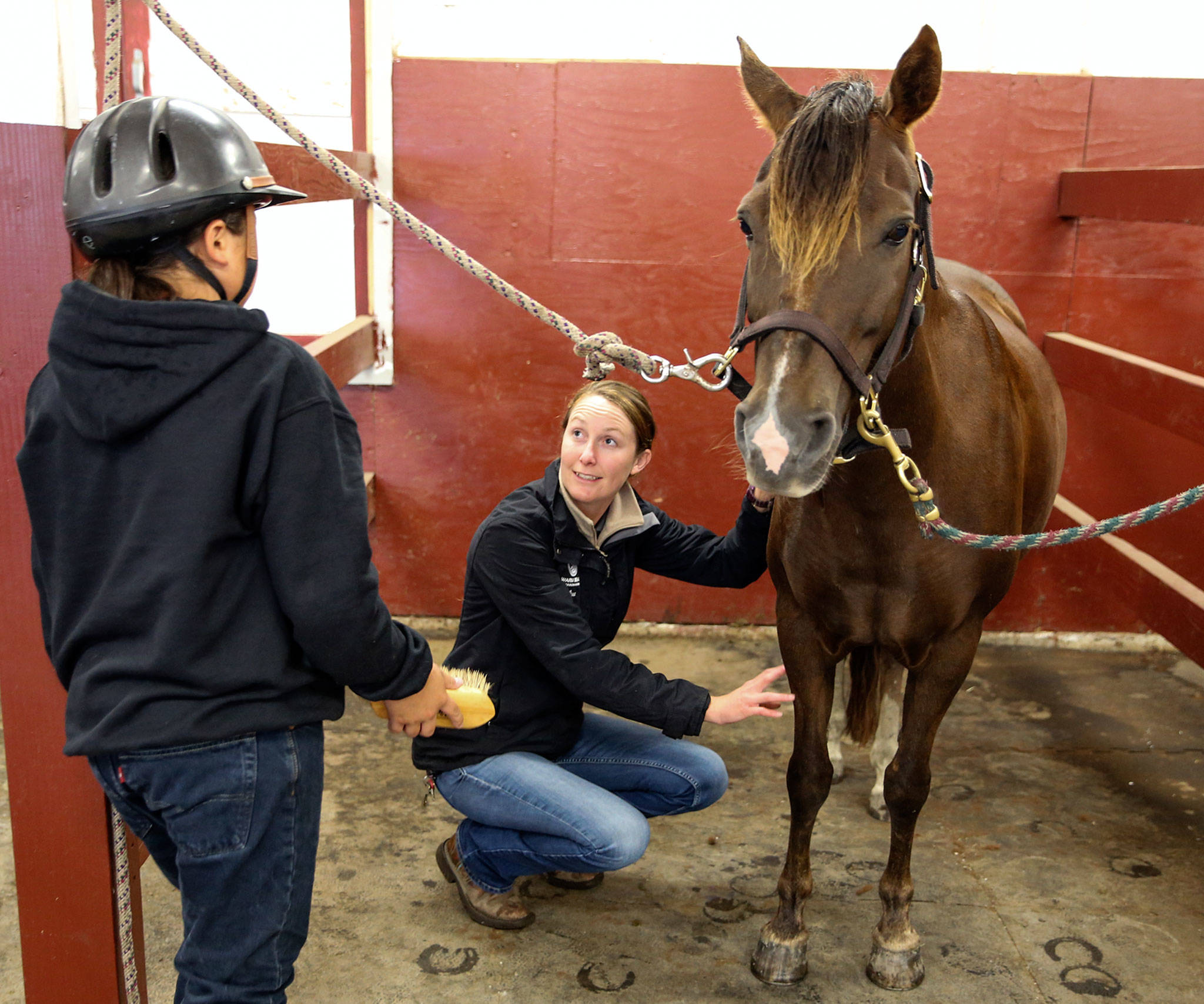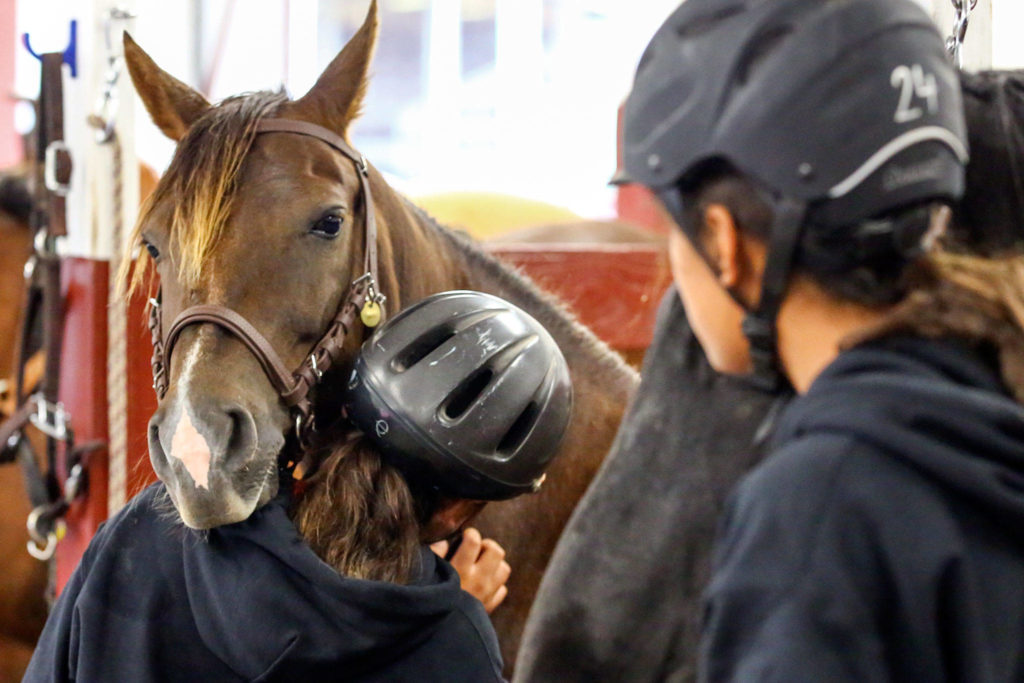WARM BEACH — Star was a little rowdier than the other horses at Warm Beach.
She liked to trot faster, and sometimes she spun in circles in the arena.
Her rider, a Tulalip boy who had been placed into the foster care system, had trouble keeping her on a uniform pace with the other horses, at first.
But by the end of a three-day camp in September, the boy managed to get a handle on riding the pony with a star-shaped brand on her hip. She kept a consistent gait as they maneuvered through formations alongside five riders: two other foster children and their chaperones.
The boy’s progress showed a growing connection to the horse.
“They were having a much more relational communication,” said chaperone Rebecca Larsen, a Quinault tribal member and foster mother of Tulalip children.
The camp, a partnership between the Tulalip Tribes and Warm Beach Camp & Conference Center, wasn’t just about learning how to ride — it offered a snapshot of how horses could teach life skills to Native American foster children.
Studies have shown equine therapy can improve emotional awareness, stress tolerance and problem-solving skills, and can be particularly effective for people struggling with emotional issues.
Two years in the making, the program has strengthened bonds between groups that haven’t interacted much in the past even though they’re neighbors: a sovereign nation that has experienced repeated trauma through history, and a Christian community on the tribes’ former land.
The right horse for the job
Therapy horses are carefully selected for temperament, said Ginger Reitz, assistant horsemanship director for Warm Beach. They’re patient, their gait is smooth and they tend not to run when startled.
The rest is up to the rider. Horses are very responsive to emotions and actions, Reitz said. If the rider does something the horse doesn’t like, the horse will express that. The rider then can make the appropriate corrections to avoid the horse’s ire.
“They don’t hold a grudge if you make a mistake,” Reitz said. “It’s not that the horse dislikes you. They dislike the behavior.”
And the rider can’t ignore the horse’s response because the animals are simply impossible to overpower. Cooperation is key.
Many of the lessons learned from working with a horse can be applied to interacting with people, Reitz said.
“The horse brings about the teaching,” Reitz said.
Equine therapy can be especially valuable for Native American foster children, who have been twice-traumatized, Larsen said.
Not only have they been ripped from their families and thrust into the foster care system, but they have been taken from their tribal communities as well. Many Native American children placed into foster care end up with nontribal parents, Larsen said.
“Now you’re taken from everything you know in the community,” Larsen said. “You’re taken from (your) culture. You’re living with people who don’t understand you, who are trying to force you to live a different way.”
To address that, Larsen and Reitz worked together to incorporate cultural elements in the September camp. That way, Larsen said, the children won’t feel isolated and are allowed a moment of healing.
Warm Beach’s instructors have been trained on how to work with people who have experienced trauma.
“What we can provide is some understanding or awareness of how trauma, whether recent or historical, shaped how people are behaving, or how they’re responding to their environment,” Reitz said. “It brings another level of understanding and acceptance, and we’re likely to take things less personally.”
Two years in the making
Planning for the three-day weekend began in 2017.
Reitz had just been hired to lead Warm Beach’s equine therapy program.
Larsen was looking into scholarships so her foster kids could attend horse camp.
They met in Reitz’s first week of work. They got to talking and decided they could do more than just a couple of scholarships. They could dedicate a whole camp to Native American children in foster care.
Both already knew the potential.
Larsen, who was in the foster care system before getting adopted into a white family, said horses remained one of the constants in her life during childhood. She moved a lot, and attended nearly 20 schools.
“It was literally my saving grace,” Larsen said. “I think there’s something to be said about the horse’s innate ability to pick up on emotions and soothe in a way that other animals can’t.”
Reitz said horses likely saved the life of her daughter, who had been hospitalized for depression in her early teens. Spending time with the Warm Beach horses changed her daughter’s perspective on life, and it inspired Reitz to become certified as a therapeutic riding instructor.
Larsen and Reitz described the camp as an opportunity for Warm Beach to serve people who are indigenous to this land.
Conversations have required a lot of “hard truth telling” about white privilege, the historical trauma the Tulalip Tribes have faced, and the land that Warm Beach occupies.
“I’m pretty direct,” Larsen said, with a laugh.
The two pitched the idea to Tulalip leaders. A $3,000 grant funded September’s camp, which acted as a pilot to show the possibilities. Larsen and Reitz said they hope to do a longer camp next year, with more kids.
Learning life skills
During the camp, Larsen’s horse, Patch, didn’t like having another steed in her space. Patch let out a whinny, and squeezed as close to the wall as she could. Larsen tried to pull her horse back, while the other rider moved away.
“Patch has a really special bubble,” Larsen said later. “It’s not OK to challenge that bubble — and that’s OK.”
She turned the encounter into a learning experience.
“Kids feel that way, too, when there’s nowhere to go, and there’s no out,” she said.
Just as Patch did, it’s important for people to give cues when they’re upset, said horsemanship director Lisa Tremain. In turn, it’s also important to understand and respond to other people’s signals, she said.
The children weren’t the only ones who learned lessons that weekend. The adults gained insight from one another.
The group stayed up late into the night that Saturday telling stories, as lightning storms rolled over Puget Sound and lit up the night sky. Larsen had the Warm Beach trainers take part in traditional ceremonies and described tribal culture and history. Children and adults alike cried.
“The kids don’t even know the beautiful healing that’s happening for them,” Larsen said of the camp. “They just know they have this amazing experience connecting with animals.”
Zachariah Bryan: 425-339-3431; zbryan@heraldnet.com. Twitter: @zachariahtb.
Talk to us
> Give us your news tips.
> Send us a letter to the editor.
> More Herald contact information.



























